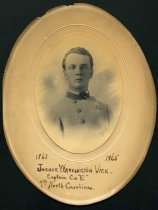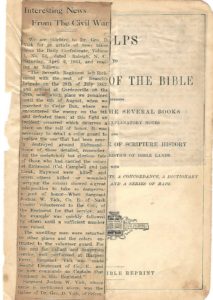SUBMITTED BY: Durant Gallup Vick; edited and vetted by Cheri Todd Molter and Laurie Jones; transcribed by Laurie Jones
Joshua Washington Vick became a doctor in Selma, North Carolina, after the war. He owned a drugstore, which he later sold to Lundsford Richardson. Richardson took the store and its products and, in the early 1900s, started Vick Chemical Company in Greensboro, which manufactured the now-famous Vick’s VapoRub—named for his brother-in-law, Dr. Joshua Washington Vick.
Editor’s notes: The attached article quotes a piece that was published on April 2, 1864 in the Daily Confederate (Volume 1, No. 58) in which Joshua Vick was recognized for a courageous act that occurred during his service as a Confederate soldier.
 According to his military records, Joshua Washington Vick was an eighteen-year-old farmer from Nash County, North Carolina, when he enlisted as a Corporal on May 25, 1861. He served in Company E of the 7th Infantry, North Carolina Troops. On Aug. 15, 1861, Vick was promoted to Sergeant. His records state that he was “wounded slightly in the head” at Sharpsburg, Maryland, on Sept. 17, 1862. In December of that year, Vick was taken prisoner at Winchester, Virginia, and was paroled a couple of days afterward. He had three promotions in 1863 and was a First Lieutenant by mid-April and a Captain by mid-December. On July, 3, 1863, Vick was wounded in his left knee at Gettysburg, Pennsylvania. After about six weeks of recovery, he returned to serve with his company. Then, Capt. Vick suffered another injury on May 15, 1864, at Spotsylvania Court House in Virginia. That time, he was wounded in his left shoulder, and his records seem to imply that he was captured again, stating that he was paroled at Greensboro, North Carolina, on May 1, 1865. As stated above, after the war, Capt. Vick returned to Selma, North Carolina. (North Carolina Troops 1861 – 65, A Roster)
According to his military records, Joshua Washington Vick was an eighteen-year-old farmer from Nash County, North Carolina, when he enlisted as a Corporal on May 25, 1861. He served in Company E of the 7th Infantry, North Carolina Troops. On Aug. 15, 1861, Vick was promoted to Sergeant. His records state that he was “wounded slightly in the head” at Sharpsburg, Maryland, on Sept. 17, 1862. In December of that year, Vick was taken prisoner at Winchester, Virginia, and was paroled a couple of days afterward. He had three promotions in 1863 and was a First Lieutenant by mid-April and a Captain by mid-December. On July, 3, 1863, Vick was wounded in his left knee at Gettysburg, Pennsylvania. After about six weeks of recovery, he returned to serve with his company. Then, Capt. Vick suffered another injury on May 15, 1864, at Spotsylvania Court House in Virginia. That time, he was wounded in his left shoulder, and his records seem to imply that he was captured again, stating that he was paroled at Greensboro, North Carolina, on May 1, 1865. As stated above, after the war, Capt. Vick returned to Selma, North Carolina. (North Carolina Troops 1861 – 65, A Roster)
 In the attached article (click on image to enlarge), there were several deviations from the cited article, so corrections have been added within brackets ([…]) to its transcription below:
In the attached article (click on image to enlarge), there were several deviations from the cited article, so corrections have been added within brackets ([…]) to its transcription below:
Interesting News from The Civil War
We are indebted to Dr. Geo. D. Vick for an article of news taken from the Daily Confederate, Volume 1, No. 54 [58], dated Raleigh, N.C., Saturday, April 2, 1864, and reading as follows:
“The Seventh Regiment left Richmond with the rest of Branch’s brigade on the 28th of July 1862 and arrived at Gordonsville on the 29th, near which place we remained until the 6th of August, when we marched to Cedar Run, where we encountered the enemy on the 9th and defeated [him]; at this fight an incident occurred which deserves a place on the roll of honor. It was necessary to detail a color guard to [replace] the one [which] had been nearly destroyed around Richmond— Some of those detailed, remembering the melancholy but glorious fate of those who had carried the colors at Richmond [Col. Campbell and 1st Lieut., Haywood were killed and seven others killed or wounded carrying the colors] showed a great indisposition to take so dangerous a post of honor— When [Serg’t] Joshua W. Vick, Co. E. of Nash County volunteered to the [Colonel] of the [r]egiment for that service; and his example was quickly followed by others [until] a sufficient number was raised.
The unwilling men were returned to [their] places and the colors entrusted to the volunteer guard. For this and for gallant and dangerous service, well performed at Harpers Ferry, [Serg’t] Vick was made [2d Lieut] of Co., E., and he now commands as Captain that [c]ompany in this [r]egiment.”
Sargeant [sic] Joshua W. Vick, whose name is mentioned above, was the father of Dr. Geo. D. Vick, of Selma.
Information pertaining to the other officers mentioned in the article:
Brigadier General Lawrence O’Bryan Branch was attached to A. P. Hill’s division and killed at Antietam on September 17, 1862.
Colonel Reuben P. Campbell served in the 7th Infantry, North Carolina Troops and was killed on June 27, 1862, at Gaines’ Mill, Virginia, during the Seven Days’ Battles.
Edward Graham Haywood was a thirty-year-old lawyer from Wake County when he enlisted in the Confederate Army on May 16, 1861, as a Lieutenant Colonel in the 7th Infantry, North Carolina Troops. Despite what was printed in the article, Col. Haywood was not killed during the Seven Days’ Battles. On June 27, 1862, he was promoted Colonel, and a couple of months later, on Aug. 29th, he was wounded during the second battle at Manassas, Virginia. On May 3, 1863, Haywood was wounded again while fighting at Chancellorsville, Virginia. On July 22, 1864, he resigned from his post due to “partial blindness, the result of a wound received at 2nd Manassas, and nephritus and cystitus” (North Carolina Troops 1861 – 65, A Roster). Four months later, he was commissioned into the Veteran Reserve Corp.
